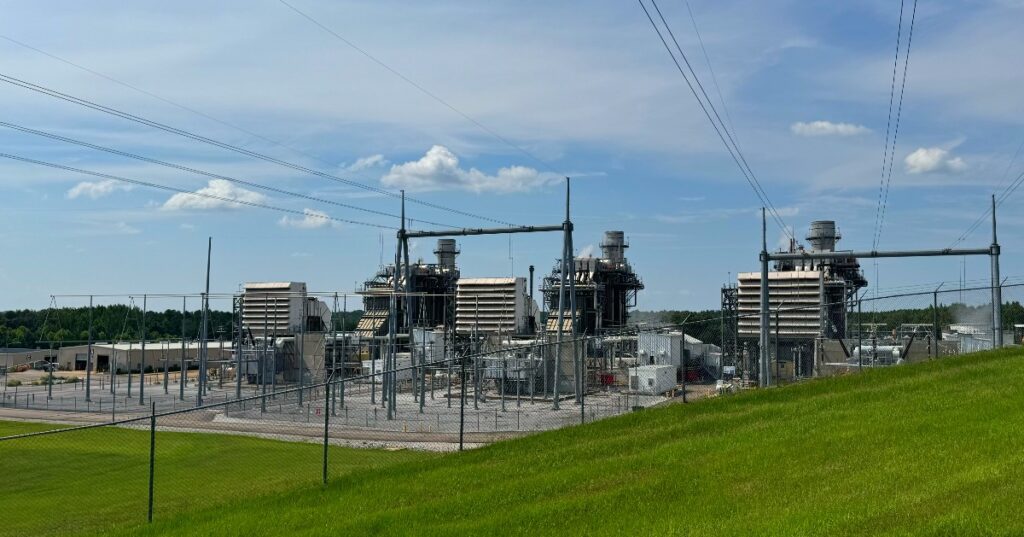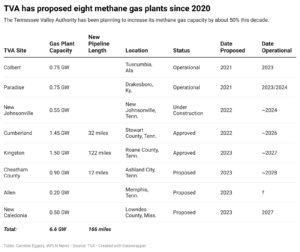
The Tennessee Valley Authority released details about one of its latest gas plant proposals in a public document last week.
TVA is planning to build a half-gigawatt methane gas plant in central Mississippi. Last week, the federal utility released a draft environmental review for the project, in which TVA considered no alternatives to a gas plant.
“The climate emergency is so in our face right now, and TVA is continuing to ignore that reality to build gas plant after gas plant,” said Gaby Sarri-Tobar, climate justice campaigner for the Center for Biological Diversity. “We need the TVA Board to take a good hard look at this, nix the plan and lead the way on renewables instead.”
The TVA Board is the main regulator for the federally-owned utility, with members appointed by U.S. presidents. The board has not made any public decisions in recent years to limit or end TVA’s fossil fuel buildout and has even given more decision-making power to TVA CEO Jeff Lyash. Lyash, along with TVA’s other top executives, have collectively banked millions of dollars for decisions to expand gas infrastructure.
“They have a very clear responsibility as TVA Board members, and it’s very concerning that they’re relinquishing that to someone with a fossil fuel agenda,” Sarri-Tobar said.
Pipeline giants will financially benefit from TVA’s gas buildout
Since 2020, TVA has proposed eight gas plants across its seven-state region, equivalent to 20% of the utility’s operating capacity, and 160 miles of pipelines.
The proposed Mississippi project is located on the Kinder Morgan pipeline system that supplies many of TVA’s other gas plants. The project will not require any new pipelines, but it will financially benefit the pipeline operator and gas producers.
 Courtesy Kinder Morgan
Courtesy Kinder Morgan Kinder Morgan has pipelines that run through Tennessee between the largest gas-producing region in the nation and the Gulf of Mexico.
Every time TVA builds a new gas plant, a pipeline operator gets more money annually selling gas on its lines. In this case, the operator will be Kinder Morgan, which transports about 40% of the gas consumed in the United States and sold $15 billion of gas services on its pipeline systems last year.
The electricity sector is the largest consumer of gas in the U.S. The electric-gas system has a lot of layers, and gas producers, pipeline operators and utilities set up contracts to ensure both sufficient fuel needs and profits for companies and investors.
These contracts are often hidden from the public, even by public utilities like TVA. In the case of the Cumberland and Kingston projects, for example, TVA set up “precedent agreements” with pipeline giants Kinder Morgan and Enbridge years before the projects were formally reviewed — the Southern Environmental Law Center has been in litigation with TVA for not disclosing these documents for the past two years.
Why TVA says it needs more gas plants
In its draft environmental review for the Mississippi project, TVA says it needs more gas plants to integrate more renewables onto the grid, as the utility plans to add 10 GW of solar capacity to its system by 2035. TVA currently has a total of 38 GW of total capacity.
This argument does not match the picture of some other countries or U.S. states outside of the Southeast. In this region, there is a large concentration of pipelines connecting the Marcellus Shale, the largest gas-producing region in the country, to the Gulf of Mexico, where the U.S. exports liquified methane gas.
(Note: This year, 96% of new electricity generation in the U.S. is expected to be renewable, battery or nuclear, while 4% will be gas. Most new gas generation is being built in the Southeast and Texas.)
South Dakota got 84% of its in-state electricity generation from renewables in 2022, while even fossil-heavy Texas generated 31% of its power from solar, wind and geothermal. TVA, which provides nearly all of Tennessee’s electricity, produced virtually zero non-hydro renewables last year and got 4% of its electricity needs from purchased solar and wind.
TVA also argues that it needs more gas plants for reliability and costs. The utility has faced federal criticism over its cost claims and gas plant reliability during Arctic storms.
Earlier this year, the Environmental Protection Agency sent a letter to TVA highlighting the utility’s lack of transparency over costs in the environmental review for the Kingston gas project — as TVA did not disclose the costs of various generation options. “TVA should consider lower cost, lower risk, and more responsible alternatives that are viable,” EPA wrote, pointing to independent research that showed a solar project would save customers over $1 billion in the next 20 years.
Just a week after EPA told TVA to prepare a supplemental environmental review, TVA ignored the federal request and Lyash approved the Kingston gas project.
How fossil fuels affect the Tennessee Valley
The fossil fuel buildout TVA is pushing this decade will continue to affect the health, environment and finances of the 10 million people in the Tennessee Valley, as well as the health of people living near and working in fracking fields. Using gas for electricity has been linked to pollution resulting in issues ranging from cognitive decline to cancer.
Fossil fuel burning is the primary cause of climate change. Last year, carbon dioxide emissions from fossil fuels reached a record high — and fossil fuels currently account for 90% of all human-caused CO2 emissions. Also, with gas plants in particular, methane pollution from leaks along the supply chain can rival the climate harm of coal in the short term.
Building new gas plants also carries financial risks for Tennessee Valley residents, who supply TVA’s non-industrial revenue through their monthly bills to local power companies, which then pay TVA. EPA says new gas plants may cost more now, especially given a new national climate law that makes renewables cheaper, and could have additional costs in the future due to potential increased gas fuel prices and government regulations.
Any member of the public can comment on the review for the proposed Mississippi gas project until Sep. 4.


